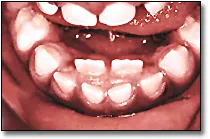Common Problems
Toothache
Make sure to clean the teeth very well and do a warm salt water rinse. Try to dislodge any food particle or debris that might be stuck in or between teeth by rinsing vigorously and using dental floss. If the pain persists longer than a day, please contact us. For temporary relief, acetaminophen is recommended (follow instructions on the bottle for proper dosing for your child). If your child has a toothache and a facial swelling, apply a cold compress and please contact us.

Over-retained Primary Teeth (“Shark Teeth”)
Most often, children loose their baby teeth naturally as permanent teeth start sprouting into their position. Occasionally, baby teeth may still be in position when a permanent tooth is trying to erupt into the same space. In these cases baby teeth may require extraction to make space for the permanent tooth to come in straight.
A very common example of over-retained primary teeth are “shark teeth” which is when lower permanent teeth start to grow in behind his or her baby teeth. The nickname comes from the fact that sharks also have a double row of teeth. “Shark teeth” are not an emergency and often don’t require any treatment. If the baby teeth do not loosen over a period of several months, bring your child in for an evaluation.
Loose Teeth
Children normally begin losing teeth around age 5-6. Children are often curious about these loose teeth and tend to wiggle them on their own. If your child complains of discomfort associated with a loose tooth you can reassure them that the tooth will come out when it is ready and the toothfairy will be waiting! If your child is having trouble eating, brushing, or has discomfort lasting longer than two weeks it may be helpful to bring your child for a quick appointment to help wiggle the tooth.
Teething
Teeth first start to erupt in the mouth around 6-9 months of age, though it may be as late as one year. Teething can be uncomfortable for your child and may cause irritability, biting, drooling, swollen gums, and decreased appetite.
Though there are many products on the market intended to ease teething pain, your child will have the most relief simply from cold and pressure. Chilled teething rings, cold and wet washcloths, chilled pacifiers, and gently massaging your baby’s gums are all helpful measures you can take. Avoid chilling teething rings or washcloths in the freezer (too cold for baby’s gums!). Also avoid numbing agents containing benzocaine (such as Orajel or Anbesol) for children under 2 years of age unless directed by a physician.
Grinding
Grinding, also known as bruxism, is an involuntary habit. It is a very common habit and many children will grow out of it with age. If you notice your child grinding, there is often no need to worry unless your child is complaining of teeth or jaw pain. For older patients with permanent teeth, a night guard can be fabricated to prevent damage to the enamel.
Thumb-sucking
Thumb-sucking is a early reflex for many children and begins when your baby is still in the womb. For young children, thumb-sucking is a natural method of self-soothing. It often provides a sense of security, comfort and relaxation for a child, which is why most children such their thumbs as they fall asleep. According to the American Dental Association, most children stop thumb-sucking on their own between ages 2-4. Some children however continue to find gratification from thumb sucking allowing the habit to persist well beyond 4 years of age. If your child is still sucking when his or her permanent teeth begin eruption, it may be time to consider action to curtail this habit before it causes changes to the teeth and growing jaws. Children respond best to positive reinforcement. A thumb-sucking chart with small rewards can help motivate a child to stop sucking. Let us know about your child’s thumb habit at your next visit so that we can assess the situation and suggest possible solutions.
Bad Breath
Inadequate brushing and flossing, cavities, gum problems, or dry mouth can be sources of bad breath. Other conditions such as digestive problems and chronic sinusitis can also cause abnormal mouth odor. If you notice bad breath, the first step is to ensure that the mouth and teeth are meticulously cleaned twice a day with a toothbrush. If your child is younger than 8 years old, they may need your help to ensure that they are cleaning each tooth surface well. If persistent bad breath is a problem, let us know so that we can investigate other sources.
Canker Sores
Canker sores, also known as aphthous ulcers, are very common among children. One in five people are affected by canker sores. Canker sores are small sores inside the mouth which can be quite painful and sensitive. They tend to be on the movable parts of the mouth (such as the tongue, inside lining of the lips, and the base of the gums). These sores typically last 1-2 weeks, and they often recur. Canker sores tend to pop up during times of stress and interestingly they tend to run in the family. If your child has canker sores, you should have them avoid abrasive foods (i.e. potato chips), acidic and spicy foods as these can all irritate canker sores. Ibuprofen and warm saltwater rinses may help alleviate discomfort. If your child has persistent or large canker sores let us know so that we can evaluate for other treatment options.
